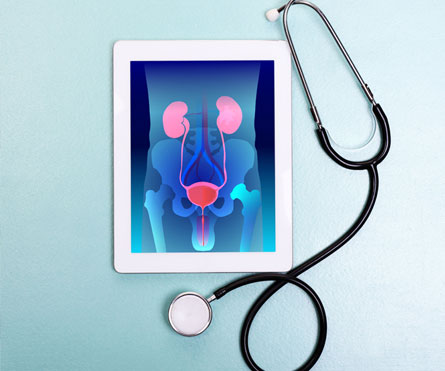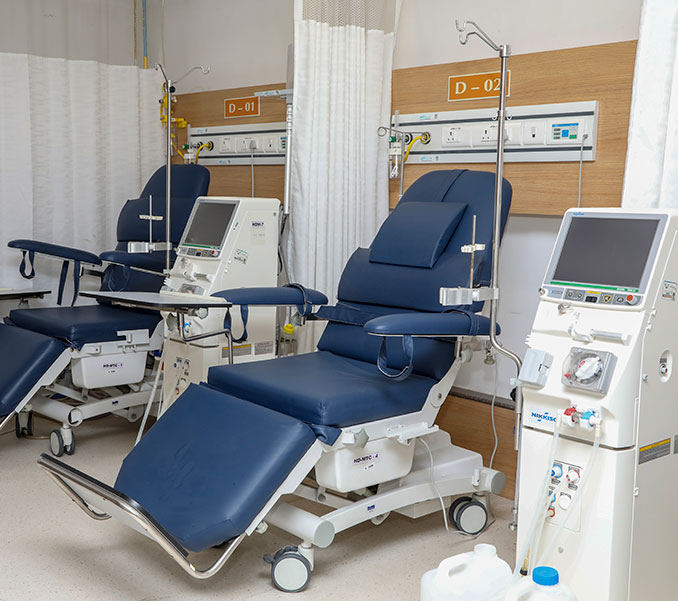
At Symbiosis University Hospital, we have a world class Nephrology Department with advanced facilities and an experienced team of doctors, nurses and technicians that are available 24x7 for any nephrology emergency. We have eight haemodialysis machines, including an isolation room for infected and Hepatitis B positive patients, and one dedicated machine for ICU patients. Each haemodialysis bed is equipped with a non-invasive blood pressure monitor. We have an auto- mated dialyzer-reprocessing machine for better cleaning and life of the dialyzer. Considering the need for strict aseptic precautions, there is a separate room for peritoneal dialysis patients. At Symbiosis University Hospital, we are committed to provide the finest evidence based management to all our nephrology patients. Our patient guide will help you better understand the nature of kidney functioning, common kidney diseases and diagnosis as well as treatments.

Nephrology is concerned with medical diseases of the kidney, as also with kidney transplantation. More than one lakh fresh cases have kidney failure (stage 5 chronic kidney disease) every year in India and require dialysis and/or kidney transplantation. It is important to know your risks and take action.
Most people have two kidneys. They are located at the back of your body below your ribs. The kidneys make urine which passes through your ureters to your bladder.
The functions of the kidneys include:
Filtering your blood to make urine, enabling your body to get rid of waste and water it doesn't need, also regulating the salts and minerals in your blood
Most types of kidney disease become progressive or worsen over time. However, it is possible to slow the progression of some types of kidney disease with good healthcare management. Close and continuous follow-up with your primary care physician and nephrologist is very important.
When your kidneys fail or stop working, dialysis is needed to maintain life. Dialysis is a form of kidney replacement therapy to remove waste products from the blood and regulate fluids. There are two kinds of dialysis:
"Kidney disease" can refer to many kinds of diseases. A common kidney disease in India is chronic kidney disease (also called CKD). CKD is the permanent loss of some kidney function. Many different diseases (diabetes, high blood pressure, some infections, etc.) or a physical injury can cause CKD.
This is a sudden occurrence of kidney failure or kidney damage that happens within a few hours or days. Acute Kidney Injury can have many different causes but is commonly caused by sepsis, shock, dehydration or certain medications.
A solid piece of material that forms in the kidney from substances in the urine. Stones can be very painful and can sometimes block your urine flow. They can cause blood in your urine. Although stones are common, they rarely cause permanent kidney damage.
A genetic disorder where numerous cysts grow in the kidneys. PKD cysts can slowly replace much of the mass of the kidneys and can lead to kidney failure.
Also called Pyelonephritis. Kidney infections are usually caused due to bacteria, which spread from the bladder.
This condition is not in itself a disease but can be the first sign of another disease that damages the kidneys. Signs include low or high blood protein and/ or blood in the urine and swelling.
Anyone can develop kidney problems, but you are at a higher risk if you have or are any of the following:
Most kidney problems have no symptoms until the disease has progressed far. Your best protection is to know if you are at risk and need to be tested.
Some symptoms can include:
Diabetes and high blood pressure are the two leading causes of kidney failure. It is important that your blood glucose (sugar) and blood pressure are checked often and treated correctly.
Other healthy behaviours:
Haemodialysis patients must follow a restricted diet and must take a variety of medicines and vitamin supplements. At Symbiosis University Hospital, we are fully equipped with eight haemodialysis machines. Our dialysis machines provide completely safe dialysis with its detectors, which enables continuous monitoring of various parameters during dialysis.